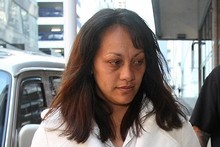By Tapu Misa,New Zealand Herald,, Monday Jul 4, 2011
It's disconcerting when you find yourself in the corner with people you've seldom (Ian Wishart), if ever (Christine Rankin), agreed with. Especially when there's an angry and unforgiving 48,000-strong Facebook community (I hesitate to use the incendiary "mob", however apt) on the other side.
 But, at the risk of becoming the second most hated woman in the country, I will say that when Breaking Silence: The Kahui Case is published next month, I intend to buy it and read it. I, for one, want to hear what the Kahui twins' mother Macsyna King has to say.
But, at the risk of becoming the second most hated woman in the country, I will say that when Breaking Silence: The Kahui Case is published next month, I intend to buy it and read it. I, for one, want to hear what the Kahui twins' mother Macsyna King has to say.
Why would I not?
Because Macsyna shouldn't be allowed to profit from her babies' death? She won't. Apart from three slices of pizza, says the book's author and publisher Ian Wishart, she's getting nothing.
Because nobody should profit? Wishart is a former award-winning journalist, who now edits the conspiracy-loving Investigate magazine. I'm not a fan of the magazine or the books he's written, but to suggest, as some in the media have, that Wishart should have turned his back on the chance to gain some insight into a case that, five years down the track, continues to generate such strong public interest and emotion, is frankly hypocritical.
 But, at the risk of becoming the second most hated woman in the country, I will say that when Breaking Silence: The Kahui Case is published next month, I intend to buy it and read it. I, for one, want to hear what the Kahui twins' mother Macsyna King has to say.
But, at the risk of becoming the second most hated woman in the country, I will say that when Breaking Silence: The Kahui Case is published next month, I intend to buy it and read it. I, for one, want to hear what the Kahui twins' mother Macsyna King has to say. Why would I not?
Because Macsyna shouldn't be allowed to profit from her babies' death? She won't. Apart from three slices of pizza, says the book's author and publisher Ian Wishart, she's getting nothing.
Because nobody should profit? Wishart is a former award-winning journalist, who now edits the conspiracy-loving Investigate magazine. I'm not a fan of the magazine or the books he's written, but to suggest, as some in the media have, that Wishart should have turned his back on the chance to gain some insight into a case that, five years down the track, continues to generate such strong public interest and emotion, is frankly hypocritical.
Human frailty and tragedy are our stock in trade in the news media. Telling stories in the hope of illuminating an issue is what we do. I would have done the same thing in his place.
Because there's nothing more to be learned? Mike Hosking might confidently assert, as he did on Close Up last week, that "I don't need to read the book - because I know what happened, and what happened is, they're a bunch of dysfunctional losers and their kids died".
But I'm inclined to the old-fashioned view that you need to read a book before you can decide if it's rubbish. There's a chance we might actually learn something, which I would have thought would be a good thing given our horrifying child abuse statistics.But I'm inclined to the old-fashioned view that you need to read a book before you can decide if it's rubbish. There's a chance we might actually learn something, which I would have thought would be a good thing given our horrifying child abuse statistics.
Read Tapu Misa's full column at the New Zealand Herald.

I think social workers, psychologists, police, teachers . judges, health professionals etc already know how these things happen . They just aren't very good at working together to try to alleviate some of the affects or have enough power to deflect the influence of dysfunctional, uncaring and damaged family members and parents.
ReplyDeleteBookbrainz